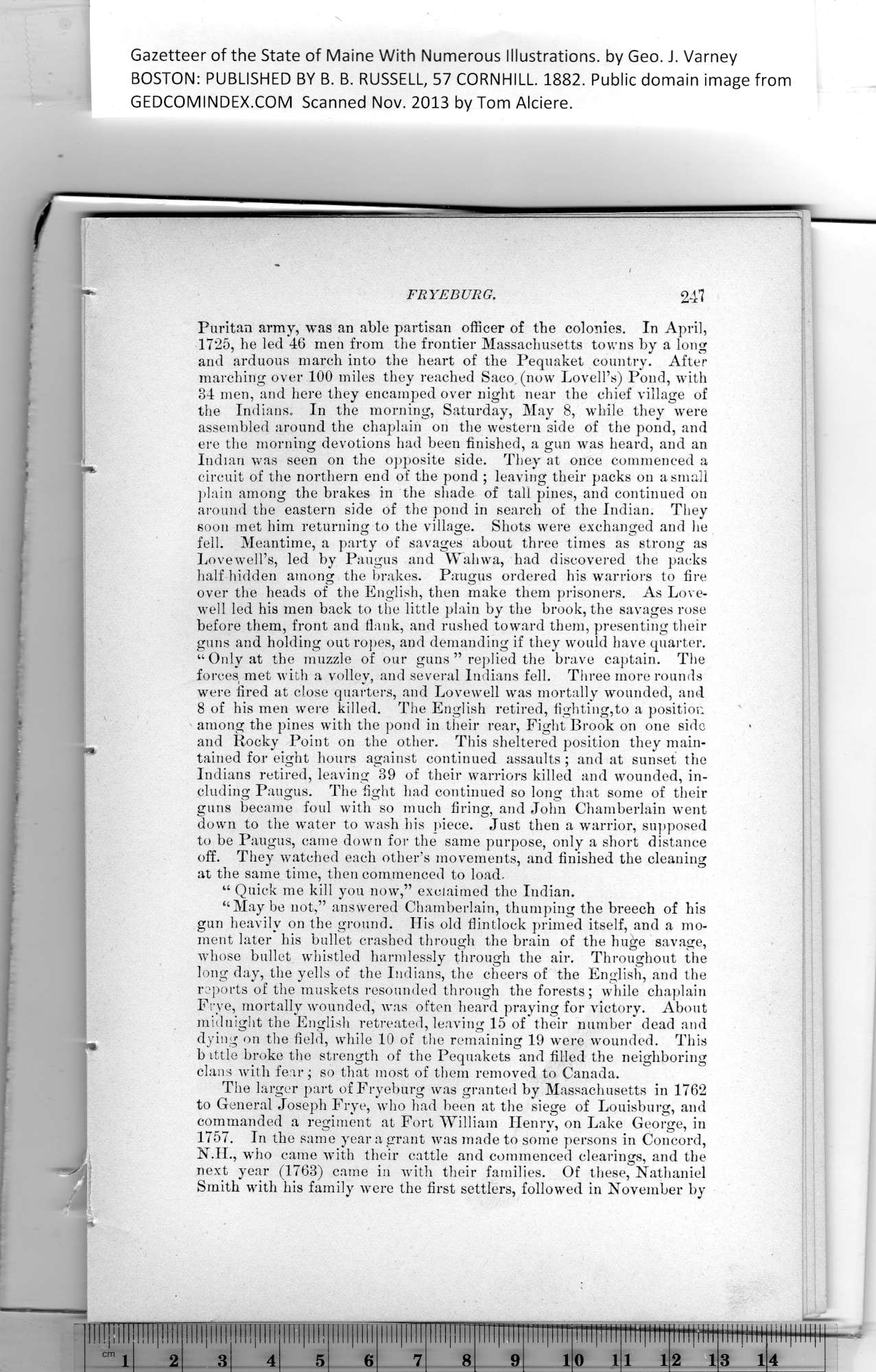|
Gazetteer of the State of Maine With Numerous Illustrations, by Geo. J. Varney
BOSTON: PUBLISHED BY B. B. RUSSELL, 57 CORNHILL. 1882. Public domain image from
FRYEBURG. 241
Puritan army, was an able partisan officer of the colonies. In April,
17‘25, he led 46 men from the frontier Massachusetts towns by a long
and arduous march into the heart of the Pequaket country. After
marching over 100 miles they reached Saco (now Lovell’s) Pond, with
34 men, and here they encamped over night near the chief village of
the Indians. In the morning, Saturday, May 8, while they were
assembled around the chaplain on the western side of the pond, and
ere the morning devotions had been finished, a gun was heard, and an
Indian was seen on the opposite side. They at once commenced a
circuit of the northern end of the pond ; leaving their packs on a small
plain among the brakes in the shade of tall pines, and continued on
around the eastern side of the pond in search of the Indian. They
soon met him returning to the village. Shots were exchanged and he
fell. Meantime, a party of savages about three times as strong as
Love well’s, led by Paugus and Wahwa, had discovered the packs
half hidden among the brakes. Paugus ordered his warriors to fire
over the heads of the English, then make them prisoners. As Love-
well led his men back to the little plain by the brook, the savages rose
before them, front and flank, and rushed toward them, presenting their
guns and holding out ropes, and demanding if they would have quarter.
“ Only at the muzzle of our guns ” replied the brave captain. The
forces met with a volley, and several Indians fell. Three more rounds
were fired at close quarters, and Lovewell was mortally wounded, and
8 of his men were killed. The English retired, fighting,to a position
among the pines with the pond in their rear, Fight Brook on one side
and Rocky Point on the other. This sheltered position they main-
tained for eight hours against continued assaults ; and at sunset the
Indians retired, leaving 39 of their warriors killed and wounded, in-
cluding Paugus. The fight had continued so long that some of their
guns became foul with so much firing, and John Chamberlain went
down to the water to wash his piece. Just then a warrior, supposed
to be Paugus, came down for the same purpose, only a short distance
off. They watched each other’s movements, and finished the cleaning
at the same time, then commenced to load.
“ Quick me kill you now,” exclaimed the Indian.
“May be not,” answered Chamberlain, thumping the breech of his
gun heavily on the ground. His old flintlock primed itself, and a mo-
ment later his bullet crashed through the brain of the huge savage,
whose bullet whistled harmlessly through the air. Throughout the
long day, the yells of the Indians, the cheers of the English, and the
reports of the muskets resounded through the forests; while chaplain
Frye, mortally wounded, was often heard praying for victory. About
midnight the English retreated, leaving 15 of their number dead and
dying on the field, while 10 of the remaining 19 were wounded. This
b ittle broke the strength of the Pequakets and filled the neighboring
clans with fear; so that most of them removed to Canada.
The larger part of Fryeburg was granted by Massachusetts in 1762
to General Joseph Frye, who had been at the siege of Louisburg, and
commanded a regiment at Fort William Henry, on Lake George, in
1757. In the same year a grant was made to some persons in Concord,
N.H., who came tvith their cattle and commenced clearings, and the
next year (1763) came in with their families. Of these, Nathaniel
Smith with his family were the first settlers, followed in November by
PREVIOUS PAGE ... NEXT PAGE
This page was written in HTML using a program written in Python 3.2
|
